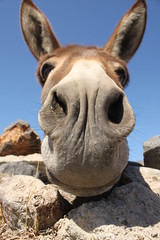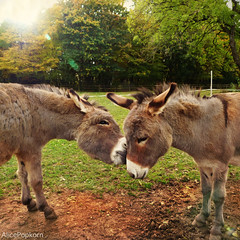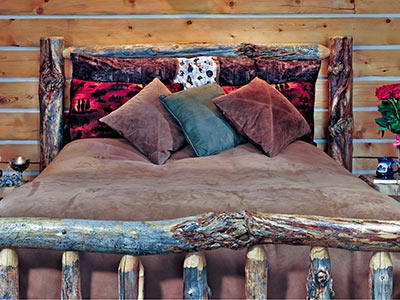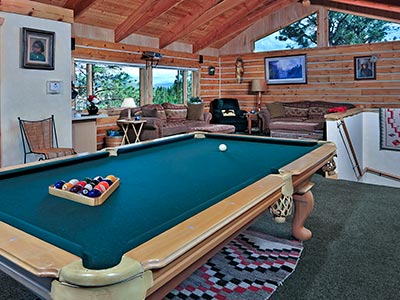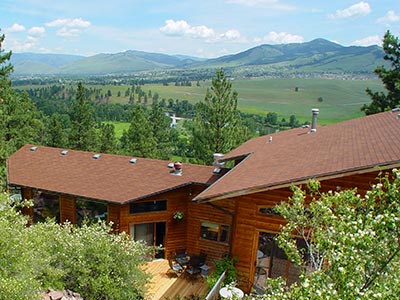A LITTLE LIMERICK:
Since International Donkey Day and National Limerick Day both fall in MAY, it seems fitting to share the following poem!
There once was a donkey named Hank
Who took part in many a prank
He’d wink his one eye
And swish at each fly
That silly donkey named Hank
-By Elaine
My first introduction to donkeys was in the Emerald Isle itself. When I was just ten, my grandfather took me on a farm tour of England, Ireland, Scotland and Wales. I can still visualize many scenes, as if it happened yesterday. One of my favorite experience was watching a donkey carry a load of milk cans down a narrow, windy road. That experience was unforgettable and I’ve loved donkeys ever since! I still keep some treasures from that special trip long ago, most of which are in our Victorian-style guest room named The Rose.
The odd thing about both donkeys and limericks is that they both are uniquely funny. I guess that’s why they are a perfect pairing of holiday themes. I do wonder if March (because of St. Patrick’s Day) would be a more fitting month than May, but here in Montana we often don’t see the lush, green of grass until May anyway.
When staying at BLUE MOUNTAIN BED AND BREAKFAST, you can always pet our four footed equines over the fence. We have two Mammoth Jackstock riding donkeys, two mules and a Norwegian Fjord horse. All of them live at the bottom of the mountain from the actual B&B. If they lived with us, we might need to rename our business “Blue Mountain Bed and BRAY!” I’ve stayed at B&B’s before that used peacock “clocks” as a wake-up call. I certainly don’t think we need to use loud birds or donkeys any time soon to wake up our happily, sleeping guests!
All of our equines are gentle enough for children to be around. In fact, Hank- pictured here, is a therapy donkey and is registered in The Donkey Hall of Fame for his various accomplishments. He loves birthday parties and becomes quite vocal about it, welcoming all the kids from every direction!
We aren’t a riding facility, but there is one just a few miles from our B&B that we highly recommend.
Dunrovin Ranch, in Lolo, has smooth Tennessee Walkers for you to ride. We’ve had many guests enjoy a few hours or a day out with one of their guides on the area trails. You can call Dunrovin ahead of time to make a reservation or wait until you arrive in Missoula.

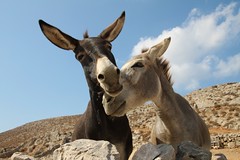
Fun Ditties About Donkeys (Most taken from Sue Weaver’s wonderful book entitled The Donkey Companion.)
- Queen Victoria of England loved donkeys. She had one that came all the way from Egypt which at times accompanied her to Florence, Italy.
- In England, it is still common for children to learn how to ride on a donkey before learning on a hunter/jumper horse.
- In Europe, it once was told that Saint Nicolas rode a donkey and children would leave carrots and bread out for his long journey.
- British chimney sweeps had donkeys carry their tools into the 1900’s.
- During the Middle Ages of Europe, people used donkey urine as a disinfectant and donkey dung for eye irritations.
- A donkey crossed with a horse is called a mule. Mules are almost always sterile and known for their smooth gate. In fact, in Medieval Europe, mules were so prized that they were reserved for the wealthy. The huge draft horses were not as commonly used by nobility as one might think, their job was to carry heavily armored knights into battle.
- In at least one occasion, a donkey has been awarded The Purple Cross.
- The ancient Egyptian word for donkey was eeyor- it came from the sound of its bray. It’s not just by accident that the well-known donkey from Winnie-The-Poo, was named Eeyore by A. A. Milne.
- Cleopatra kept over three hundred female donkeys so she could bath in the milk they produced.
- It has been said that Satan is unable to shape-shift into donkey form because of the Christian cross which the donkey bares on his back (Most Mammoth donkeys do not have the cross, however).
- In some cultures when a woman is pregnant it’s said that she should visit a donkey so her child will grown up to be wise and well behaved.
- Some ancient Romans had beds with donkey head-shaped bedposts on them to give them fertility luck.
- When Andrew Jackson ran for president, his opponents nicknamed him “jackass.” Jackson, a democrat, used the name to his advantage, placing a donkey picture on his campaign posters. Wondering about the elephant? Click on this same link.
- George Washington is sometimes referred to as both the Father of America as well as the Father of the American mule- a fascinating story everyone should read about.
- Donkeys are often depicted as being stubborn, but in reality they are cautious. Instead of having the flight response of the horse, they stand and fight- a geographic necessity based on their original desert-like environment.
- Several old U.S. state laws still mention that it is unlawful to keep a donkey in a bathtub. We wonder what brought that to the attention of lawmakers?
- Donkeys, like horses, should never be kept in solitude because they are very social animals. When a jack donkey is totally isolated, he can become even more dangerous than a stallion for several reasons.
- Certain domesticated and wild asses are endangered. The list includes the French Poitou, the Andaluz Ass and the Samali Wild Ass. Many people don’t realize that certain farm animals are endangered.
- Mammoths, like our Hank, are supposed to be referred to as Mammoth Jackstock or Mammoth Asses instead of donkeys. That can get confusing since a Jack is an un-gelded male. What do we call ours? A DONKEY!
- The only qualification for an ass to be considered a Mammoth is for Jennets (females) to be 56″ or taller and jacks and geldings to be 58″ or taller.
- Donkeys only have 62 chromosomes, while mules and horses have 63. A person can refer to all of them combined as equines.
- Christopher Columbus came to the New World with two jennies and four jacks on his second trip.
- There are four basic donkey sizes: Mammoth, Large Standard, Standard and Miniature.
- All domestic donkeys are descendants of the African Wild Ass. The ass was the only riding and pack animal even available in Egypt’s Old Kingdom. Camels and horses were used later on.
- A burro or donkey that really likes you will follow you around just like a big dog might. Donkeys can also become protectors of a field and “their” sheep and sometimes are used as guard animals. Dogs are viewed as natural predators, so if you need to introduce the two, do it gradually or you may have one dead dog!
- Donkeys are wonderful singers, this is because they can both inhale and exhale air unlike horses. In the Southwest, donkeys are often referred to by the Spanish name “burro” as well as the “Arizona Nightingale.” I will say this about the donkey- it is indeed, one very funny “bird”!

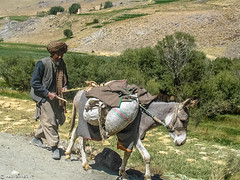
If you enjoyed learning some of these fun-filled facts, you may wish to purchase the following books or find them at your local library!
-The Donkey Companion Selecting, Training, Breeding, Enjoying & Caring for Donkeys by Sue Weaver (The majority of the information above comes from this resource.)
–Training Mules and Donkeys: A Logical Approach To Longears by Meredith Hodges
–The Definitive Donkey A Textbook on the Modern Ass by Betsy and Paul Hutchins
-“The Brayer Journal of the American Donkey and Mule Society”
*If these aren’t enough, just click on the following link for a long list of donkey-related articles!

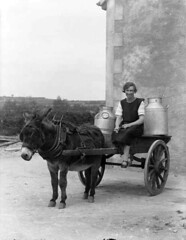
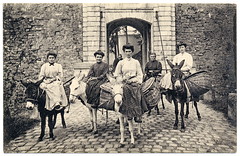
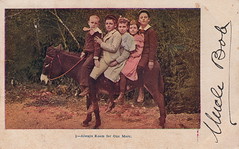
You will also enjoy following the Team Donk blog written by Kristi Kingma whom we purchased Hank from. She uses her donkeys as pulling machines which is pretty amazing to watch. Hank prefers to be a riding donkey and desperately wanted to be around children again. Thus, in the fall of 2013, Hank made a trailer trek from Idaho to Montana. He now is an official Montana citizen and proudly “wears” Montana’s only zip code number: 406!
Hank is such a kind, gentle, yet inquisitive soul and truly a KICK to be around so to speak. In actuality, if you treat donkeys well, they are 99 times more likely to follow you around like a puppy dog than kick you. Both donkeys and mules can kick sideways as well as back and are notorious for taking their anger out on an abuser at the least expected moment. However, if you treat a donkey well, he or she will become your loyal and trusted friend.
When placing a young child on an equine for the first time, I’d almost always choose a donkey over a horse. Many folks have never been let in on the secret of donkeys and mules- they are the cadillacs of the equine world: smooth, steady, trustworthy and built to last. If you get a hankering to meet a donkey, you know where to find one. HANK is always hanging around the farm waiting to meet new friends!
SMOOCH?
